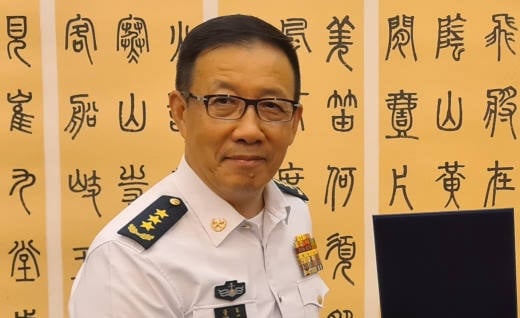
For the first time, China has appointed a naval officer as the Minister of National Defense, state-controlled media reported on Friday.
Adm. Dong Jun, former commander of the People’s Liberation Army Navy, fills a slot left vacant since Oct. 24 when Gen. Li Shangfu was formally dismissed. Li has been missing from public view since August. Some outlets report he had been arrested for corruption in his previous role as Director of the Equipment Development Department of the Central Military Commission.
Dong, 62, has commanded the PLAN since September 2021. He was succeeded by submariner Adm. Hu Zhongming on Monday. Unlike foreign counterparts, China’s Minister of National Defense is a ceremonial role focused on diplomacy with no operational or policy control. China’s military is overseen by the Central Military Commission (CMC) chaired by China’s president. The Minister of National Defense usually is a member of the CMC and it is likely Dong would take the CMC seat previously held by Li before his expulsion.
Dong’s previous appointments include deputy commander of the PLAN in 2021, deputy commander of the PLA Southern Theatre Command, Deputy Chief of Staff PLAN and deputy commander East Sea fleet. There is no information publicly available as to his branch specialization or whether he has commanded any ships during his career. Dong’s appointment surprised a number of PLA analysts who expected PLA Chief of the Joint Staff Department and CMC member Gen. Liu Zhenli to be appointed to the post. Liu spoke with Chairman of the Joint Chiefs of Staff Gen. C.Q. Brown on Dec. 21 as the U.S. and China resumed high-level communications that had been suspended by China following then-Speaker Nancy Pelosi’s Aug. 2022 visit to Taiwan.

China had also refused talks between then Minister of National Defense Li and Secretary of Defense Lloyd Austin until the U.S. removed the sanctions it imposed on Li in 2018. Li was sanctioned for transactions with persons already under sanction by the Countering America’s Adversaries Through Sanctions Act (CAATSA)for procuring Su-35 fighter jets in 2017 and S400 surface to air missile systems in 2018. Dong has not been sanctioned by the U.S., thus removing one obstacle to a meeting with Austin.
Li is not the only former Chinese Defense Minister under investigation. His predecessor Gen. Wei Fenghe, who resigned in March this year with Li replacing him, also disappeared from public sight in August amidst an ongoing investigation into corruption within the PLA Rocket Force. Wei was commander of the Rocket Force from Oct. 2012 until Sept. 2017 and became Minister of National Defense in March 2018. At the end of July, China took the unprecedented step of appointing a navy officer to head the rocket force and an air force officer as its political commissar, instead of appointing officers internally from the Rocket Force itself. News reports also said that the former commander and his deputy, along with another officer of the command, were under investigation for corruption.
So far China has not made any public charges or trials for Li and Wei, though the investigation is said to be ongoing. State media reported Thursday that the Chinese People’s Political Consultative Conference had revoked the membership of three Rocket Force members who held positions in China’s defense industry. The members, who were only listed by name and not their posts, were Liu Shiquan, chairman of China Aerospace Science and Industry Corporation (CASIC); chairman of China Aerospace Science and Technology Corporation (CASC); and Wang Changqing, a deputy manager at CASIC. Both CASIC and CASC are involved in the development and manufacture of tactical and strategic missile systems.





